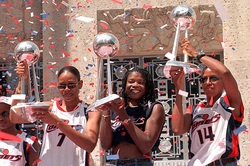 Tina Thompson (left) Sheryl Swoopes (centre) Cynthia Cooper (right). Photo credit: AP/Brett Coomer Tina Thompson (left) Sheryl Swoopes (centre) Cynthia Cooper (right). Photo credit: AP/Brett Coomer Tina Thompson's imminent retirement from the WNBA will officially mark the end of an era for women's sport. Thompson is the last remaining member of the class of players from the inaugural season of 1997. She will retire as the league's all-time leading scorer and second behind Lisa Leslie in rebounds. Hers is a career of remarkable longevity, having emerged from the shadows of Cythia Cooper and Sheryl Swoopes to become a star in her own right. She will most likely be remembered as one-third of the trailblazing trio of Houston Comets who captivated audiences while winning the first four WNBA titles. The first draft pick in WNBA history, Thompson is also the only woman to play in each of the 17 seasons since the league's inception. Although the WNBA has had its share of stars in Thompson, Swoopes, Cooper and Leslie, it has long suffered from sporadic media coverage. I remember tuning into SportsCenter to find out the score of a 2005 WNBA Finals game; I had to wait until the second half of the telecast before getting a brief recap of the Sacramento Monarch's championship clinching win. I was bowled over that a major professional sports team got only a footnote after winning a title. In my eyes, this firmly situated the lowly position of women's professional sport within the overall superstructure of a male-dominated culture. My outrage at ESPN's coverage was often met by the usual chauvinistic replies: the women aren't as good, their brand of basketball is inferior, nobody wants to watch that. I've always felt that ESPN had a cultural responsibility to help mould the way men view women's sport. To my mind, even if ratings demanded otherwise, ESPN should have run that story at the top of the show. Money, money, money - I know. At the risk of sounding cliché, sometimes there are things more important than the almighty dollar, even when trying to run a successful business. What would have been ESPNs net loss for moving up the story and giving it a bit more airtime? Obviously, I don't have the answer to that question, but it seemed to me like a major missed opportunity to make a statement about the network's commitment to the advancement of women's professional sport. While doing a bit of research for this piece, I googled "why does the WNBA struggle to survive?" Half-way through writing my question, Google auto-finished the sentence with "why does the WNBA even exist anymore?" In order for women's sport to thrive, we've got to move past comparing women's athletic ability with men. WNBA players will never be able to compete with NBA players, but that is beside the point - they are good in their own right and should not be wantonly ostracised by men who feel their domain has been encroached upon.
Yesterday marked the 40th anniversary of the "Battle of the Sexes" tennis match between Billie Jean King and Bobby Riggs. Fresh off the realization of Title IX, the match was billed as a referendum on gender roles and King's victory played a key role in allowing women's participation in sport to progress. In 2013, that women should be faced with having to justify their worth on the field of play is a ludicrously antiquated notion. The pioneering women of the WNBA were a manifestation of the hard work done by Billie Jean King and the founding members of the Virginia Slims/WTA Tours. Many decades of hard work and sacrifice led to the birth of the WNBA; women have earned their place in the professional sport landscape. It has been a long road for the league - the Houston Comets, winners of the first four WNBA titles, folded in 2008. Thompson, Swoopes and Cooper have no arena in Houston from which to hang their jerseys. Players often play overseas in the offseason in order to supplement their WNBA salaries. Still, the league survives. The duo of Brittney Griner and Elena Delle Donne promise to rejuvenate the league and secure its future for years to come. Below I have compiled a list that pays homage to the first class of WNBA players. It's not all inclusive by any means, but in the wake of Tina Thompson's retirement, we should all take a step back and pay respect to a group of women who participated in something truly remarkable: Cynthia Cooper Sheryl Swoopes Tina Thompson Lisa Leslie Rebecca Lobo Nancy Lieberman Ruthie Bolton Kim Perrot Teresa Weatherspoon Michele Timms Jennifer Gillom Andrea Stinson Eva Nemcova Margo Dydek Mwadi Mabika Penny Toler
0 Comments
Leave a Reply. |
ARCHIVES
September 2022
|
 RSS Feed
RSS Feed